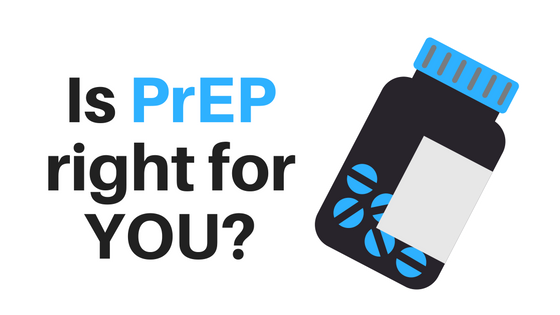HIV : Should You Be on PrEP?
PrEP—Pre-Exposure Prophylaxis—can prevent HIV infection. If taken the same time every day in the dosage prescribed by a doctor, it can really lower risk of getting HIV. PrEP is not just a pill but a system that includes the pill.
This blog post is not meant to be used in place of professional medical guidance, but to understand more about PrEP and how to talk to your doctor about it.
Who Should Take PrEP?
PrEP is a good idea for people to consider.
The CDC recommends you talk with your doctor about it if you:
Are HIV-negative
OR
have multiple partners
OR
have had sex in the past 6 months without a condom (bottom or top)
OR
had a STD in the last 6 months
OR
have a partner who is HIV-positive
Getting & Taking PrEP
Once you are taking PrEP, your doctor will likely ask you to follow certain directions, like:
- You take one pill every 24 hours.
- You take it at the same time every day.
- You do not share your medication with anyone.
- You get an HIV and STD test every 3 months.
- You get examined for kidney function test.
What You Should Know about PrEP
PrEP is not 100% effective at preventing HIV (more like 92-99%). You could still get HIV. Most importantly, PrEP does not protect you from other STDs like chlamydia, gonorrhea, and syphilis. Condoms add protection from those STDs. We suggest talking to your partner(s) about their HIV and other STD status.
Some people experience side effects when taking PrEP. Luckily, side effects are not that common, and they usually go away within about a month. When people do experience side effects, they are typically nausea, headaches, or gas. If you notice any of these issues, talk to your doctor about over-the-counter drugs that can help manage them.
If you are on PrEP and decide to stop for any reason, talk to your doctor first.
Resources:
We want to hear from you. What are you hearing about PrEP? Is it a tool you or your partner(s) could use? Do you have reservations about PrEP?
Stephen Hicks
Health Equity & Capacity Building Manager, NCSD




Besides Truvada for HIV prevention, they should take a broad-spectrum antibiotic such as Doxycycline before raw sex to protect against chlamydia, gonorrhea, and syphilis, etc. Doxycycline works ALL the time. I used to take it, with my doctor’s consent, when I was sexually active.
One Doxycycline capsule (which last 12 hours) taken before the hookup, group or sex party and all chlamydia, gonorrhea, and syphilis-causing germs were BLOCKED and the periodic test for sexually transmitted diseases (STD) always came back negative. A former friend used to take a Cipro tablet, another broad spectrum antibiotic, and obtained the same protection. By the way, the side-effects that were recently mentioned in the news about Cipro occurred only when someone is on a long-term treatment (several months) with Cipro. I am talking here about a limited, as needed use of the antibiotic.
Some years ago, a medical study was published showing the benefits of broad-spectrum antibiotic prophylaxis in reducing the rates of STD. However, it never made it to the “news” because the sex police feared that it would be equivalent to condoning free sex or worse yet, free raw sex.
Mmmmmm. …decide between either making healthy sexual choices, seeing my doctor less, fewer tests, less medical expenses and no medication or engaging in risky behavior, taking a pill that may harm my kidneys and put me at risk for acquiring HIV, seeing my doctor more often, more tests and medical expenses?
Just hear it. “I’m safe! I’m on PrEP!”
PrEP is very pricey–about $1,500+/month.
welcome to the prep political marketing gestapo. your kidneys are failing, you just got another std, and the last guy just swore to you he was on prep and was HIV neg, but now you have HIV, maybe the condom wasn’t such a bad idea after all.